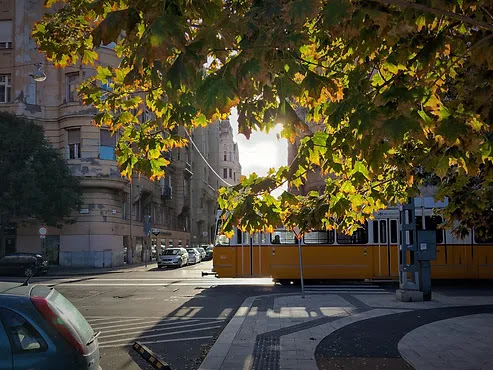Fundățica - Bucharest (Romania)
Uber - 48.8 km (1 hour)
Cost €40
Regional Train - 166 km (2h 45 mins)
Cost €18
Total distance travelled - 2,813 km
When it came time to leave Mama Țica and her seven unkempt dogs to their farm amid the mountains, it was Nico, our friendly Uber driver, who came to pick us up. The trip to the Brasov train station was only 50 km, but for the transformation which took place around us Nico's silver van may as well have been Doc Brown's Delorean. We had hardly departed the forest-muted valley, when we found ourselves crowded by cars in front of Gara Centrală Brașov, the communist era station building spread like a giant concertina before us.
Noting our towering backpacks and air of bewilderment, the ticket vendor asked if we were Ukrainian refugees (as they travel for free). After assuring her our exile was self-imposed, we booked the next train to Bucharest. The tickets for the roughly 3 hour trip cost 90 Lei (€18) for two adults and one child - the younger two, being under 6, would be free loading again. Wending our way through the station's hustle, we found a cafe staffed by two young women with tattoos and rockabilly bangs. The flat white, served in a cardboard cup and complete with fern-like pattern on its surface, confirmed our return to civilisation. Suddenly, we were back in the fray.
We found our carriage almost empty with coach style seating and a first class section concealed by a faded yellow curtain. Locating our seats, we quickly slipped into our travel routine. For the two older kids, that meant drawing, audio books and snacks (today a bag of Mama Tica's renowned Golgos). Our toddler preferred to totter up and down the aisles collecting smiles, winks and the odd sweet or two. J and I took turns to shuffle along with her, stooped so she could grip our fingers, while bracing against the lurch of the train.
Our route took us south along the Prahova river, through Grimm's Brother forests concealing timeless Transylvanian villages. It felt a shame to leave a place of such beauty for a city whose reputation for ugliness and petty crime was legendary. But an unforeseen dental appointment beckoned, and Bucharest was the next big city down the line. We would be spending three nights in an apartment in the old town. Eventually, we left the shadow of the Carpathians and coasted onto the Romanian plain - the eastern fringe of the vast Eurasian Steppe. The sky opened wide as we travelled through mainly rural countryside, the train gradually filling as the landscape lost its charm. I could feel my trepidation towards the big city deepening. Then, just as the kids were getting scratchy, we plunged into the urbanisation and industry of Bucharest.
The journey from our platform at Bucureşti Gara de Nord to our accommodation was a Dadaist din of lights, limbs and voices roiling around us. On the subway, I felt unkempt. I watched our kids gape at the milieu, grasping their walking staffs like talismans from the forest. Emerging from the underground station at Piata Unirii, we were dazzled by a network of flashing neon fountains. Streams of traffic coursed bafflingly through the sprawling waterworks around us. I turned to my phone for guidance, trusting the line of blue dots to navigate us to safety. Keeping each other within arm's reach, we joined the flow.
Following the directions to our accommodation, it became apparent that the historic centre of Bucharest was not the quaint refuge of cobbled streets and pigeoned plazas we had imagined. Entering the pedestrianised zone, the rush of traffic was replaced by the thump of pop music and the smell of red bull, spilt beer and burnt pizza. Hawkers and schemesters prowled through the excited crowds touting everything from glow in the dark necklaces to budgerigars. Young people flashed menus and promises of happy hour at us, but all we wanted was to find our apartment, unload our backpacks and take a breath. Our son, in an attempt to raise his own spirits, said at one point, "Well, at least we're not staying here..." At that moment, I looked at my phone, pointed at a "Guinness" sign and said, "That's our gate."Thankfully, the apartment which greeted us past the dank stairwell was clean, tidy and homely. Over the next couple of days, (despite the lack of sleep, induced partly by our restless one year old partly by the crappy music hammering through the walls) we boarded the rattling trams and explored the city.
We were put off the idea of visiting Romania's Black Sea coast, by a goateed Uber driver who said it would be too windy and cold in October, we should go to Greece or Turkey instead. We could catch the night train straight to Istanbul, but that would mean travelling straight through Bulgaria, a country I was looking forward to exploring. After weighing up our options, we decided to take the slow option - it had worked for us so far. We would travel over the border to Ruse, which my guidebook touted as the Bulgarian Vienna. It would mean reconnecting with the Danube, over 1000 km downstream from where we last crossed it at Budapest. So, we set our sights on Bulgaria, knowing little about the country, and even less about the adventures and mishaps that awaited us there.







.jpg)




.png)








